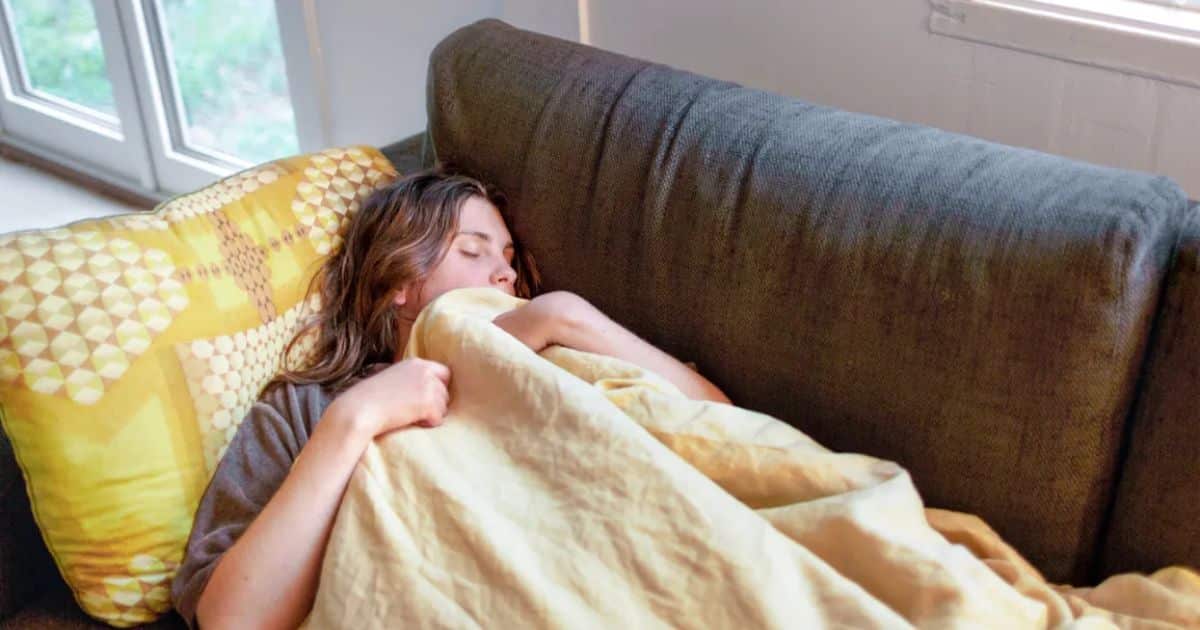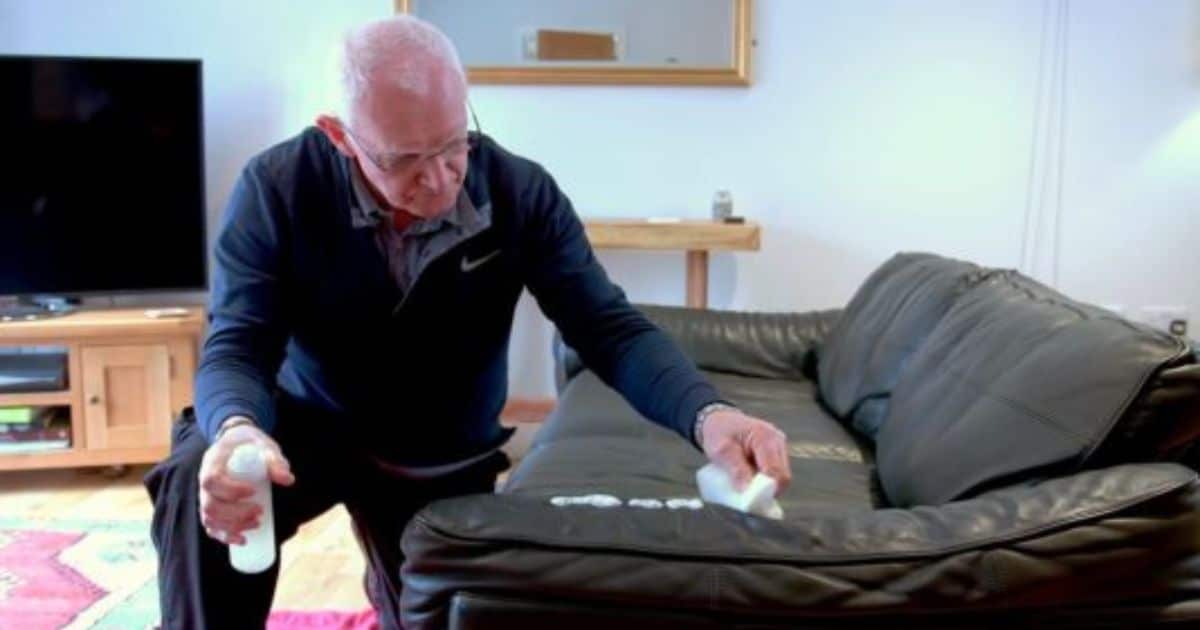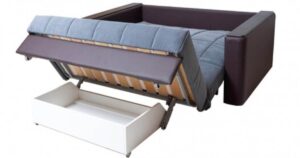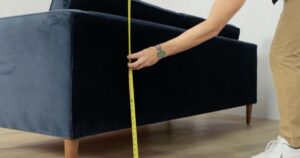In the pursuit of comfort, many individuals find solace in sleeping on their sofas. However, there is a lingering question: does sleeping on a sofa ruin it?
This article aims to debunk common myths and provide expert insight into the impact of sleeping on sofas. By exploring the structural integrity, comfort implications, and potential damages associated with frequent sofa sleeping, readers will gain valuable knowledge to help them make informed decisions about their furniture and maintain its longevity.
Key Takeaways
- Sleeping on a sofa can lead to discomfort and potential health issues due to the lack of support and improper spine alignment.
- Investing in a sofa bed with a comfortable mattress or using additional support such as pillows can improve sleep quality on a sofa.
- Frequent sleeping on a sofa can cause wear and tear, weaken the frame, and result in stains and odors from spills and body oils.
- To protect your sofa from sleep-related wear and tear, use a sofa cover or throw, avoid eating or drinking on the sofa, regularly vacuum and spot clean, and rotate the cushions.
The Impact of Sleeping on a Sofa
When it comes to sleeping on a sofa, there are several factors that can influence the impact it has on an individual’s sleep quality.
One significant factor to consider is the sleep deprivation effects that can occur from sleeping on an uncomfortable surface. Sofas are not designed with optimal support and comfort in mind, which can lead to tossing and turning throughout the night, resulting in a restless sleep.
Furthermore, the health consequences of poor sleep quality should also be taken into account. Lack of quality sleep can lead to a range of health issues, including increased stress levels, decreased cognitive function, and an increased risk of chronic conditions such as obesity and cardiovascular disease.
Therefore, it is important to prioritize a proper sleep environment to ensure a restful and rejuvenating sleep each night.
Common Myths About Sleeping on Sofas

There are several common myths surrounding sleeping on sofas that need to be addressed.
One myth is that the quality of sleep on a sofa is inherently poor, but this is not necessarily true as some sofas are designed specifically for comfort and support during sleep.
Another myth is that sleeping on a sofa can cause back pain, but this is largely dependent on the individual’s posture and the quality of the sofa.
Lastly, there is a concern that sleeping on a sofa can ruin its durability, but with proper care and maintenance, sofas can withstand regular use for sleeping.
Sofa Sleep Quality
One common myth about sleeping on sofas is that it is as comfortable as sleeping on a regular bed. In reality, sofa sleep quality is often compromised due to various factors.
Here are three important considerations regarding sofa sleep quality:
- Lack of support: Sofas are not designed to provide the same level of support as a mattress, which can result in discomfort and body pain.
- Poor sleep posture: Sleeping on a sofa can lead to improper alignment of the spine, causing discomfort and potential long-term issues.
- Disrupted sleep patterns: Sofa sleepers may experience interrupted sleep due to discomfort, resulting in poor sleep hygiene and daytime fatigue.
To improve sofa sleep quality, it is recommended to invest in a sofa bed with a comfortable mattress, use additional support such as pillows, and establish a consistent sleep routine.
Back Pain Risks
Sleeping on a sofa can pose significant risks of back pain, despite common myths suggesting otherwise. While some people may believe that sleeping on a sofa can provide comfort and alleviate back pain, the reality is quite the opposite.
Sofas are not designed to provide adequate support for the spine during sleep, which can lead to improper alignment and strain on the back muscles. To prevent back pain, it is crucial to prioritize proper spinal alignment and support.
Investing in a quality mattress that offers the right level of firmness and support can significantly reduce the risk of back pain. Opting for a mattress that contours to your body’s natural curves and provides adequate lumbar support can make a significant difference in preventing back pain.
Sofa Durability Concerns?
Sofa durability is often a concern when it comes to sleeping on sofas, as there are common myths that suggest it may ruin the furniture. However, it is important to separate fact from fiction when it comes to sofa wear and tear caused by sleeping habits.
Here are three common myths debunked:
- Myth: Sleeping on a sofa will cause permanent damage to the cushions. While excessive use may lead to some wear and tear over time, a well-made sofa can handle occasional sleeping without significant damage.
- Myth: Sleeping on a sofa will cause the frame to weaken. In reality, modern sofa frames are designed to support the weight of multiple people and withstand regular use.
- Myth: Sleeping on a sofa will affect the overall lifespan of the furniture. As long as you maintain your sofa properly and avoid excessive jumping or rough handling, occasional sleeping should not significantly impact its lifespan.
Understanding the Structural Integrity of Sofas

The structural integrity of a sofa is crucial for maintaining its longevity and ensuring optimal comfort for users. When it comes to sofa construction, there are several factors to consider. One key aspect is the quality of the frame, which provides the foundation and support for the entire piece of furniture. A sturdy frame, typically made of hardwood or metal, ensures that the sofa can withstand regular use and weight distribution. Additionally, the quality of the cushions and upholstery materials play a role in the overall durability of the sofa. Investing in a sofa with high-quality foam or down-filled cushions can contribute to its structural integrity and longevity. To further understand the importance of sofa construction, the table below highlights key components and their impact on the structural integrity of a sofa.
| Component | Description |
|---|---|
| Frame | Provides stability and support for the sofa. |
| Cushions | Contributes to comfort and durability. |
| Upholstery | Protects the sofa and adds aesthetic appeal. |
| Springs | Enhances comfort and bounce. |
| Joints | Ensures the structural stability of the sofa. |
Understanding the structural integrity of a sofa is essential as it directly affects its comfort and longevity. With a solid construction, the sofa can withstand the rigors of regular use and provide a comfortable seating experience. However, it is also important to consider how sleeping on a sofa affects comfort, which will be discussed in the subsequent section.
How Sleeping on a Sofa Affects Comfort
Sleeping on a sofa can have an impact on its comfort level. One of the factors to consider is the lifespan of the sofa after frequent sleep usage.
Over time, the cushions may become compressed and lose their support, resulting in a less comfortable seating experience.
Sofa Lifespan After Sleep
After a night spent resting upon it, the comfort of a sofa can be significantly impacted by the manner in which it was slept on. While sleeping on a sofa occasionally may not cause any long-term damage, it can affect its lifespan and overall comfort.
Here are three ways sleeping on a sofa can impact its lifespan:
- Uneven wear and tear: Sleeping in the same position night after night can cause certain areas of the sofa to become compressed, leading to uneven wear and tear. This can result in a less comfortable seating experience over time.
- Decreased cushion support: Sleeping on a sofa can put additional pressure on the cushions, causing them to lose their shape and support. This can lead to sagging cushions and a less supportive seating surface.
- Stains and spills: Sleeping on a sofa increases the likelihood of spills, stains, and dirt accumulation. Regular cleaning and maintenance are necessary to keep the sofa looking fresh and to prevent any unwanted odors from developing.
To maintain the comfort and lifespan of your sofa, it is recommended to avoid sleeping on it regularly. Instead, use the sofa for its intended purpose of seating and consider investing in a separate bed for a good night’s sleep.
Impact on Cushion Support
An article determiner: An
When it comes to sleeping on a sofa, one of the key aspects to consider is the impact it has on cushion support and overall comfort.
The cushion density and the choice of sofa material play a significant role in determining the level of comfort experienced while sleeping. Cushion density refers to the amount of fill material inside the cushions, which affects their ability to provide adequate support. Sleeping on a sofa can compress the cushions over time, reducing their density and supportiveness.
Additionally, the choice of sofa material can also impact cushion support. Materials like memory foam or high-quality foam tend to retain their shape better, providing better support for sleeping.
However, frequent sofa sleeping can lead to potential damages, which we will discuss in the subsequent section.
The Potential Damages of Frequent Sofa Sleeping
The frequent use of a sofa for sleeping can potentially cause significant damages to the furniture. Here are three potential damages that can occur:
- Structural damage: Constantly using a sofa as a bed can put excessive strain on the frame, leading to weakened joints and sagging. This can compromise the overall stability and durability of the sofa.
- Stains and odors: Sleeping on a sofa without proper protection can result in spills, sweat, and body oils seeping into the fabric or upholstery. Over time, this can lead to unsightly stains and unpleasant odors that are difficult to remove.
- Decreased lifespan: Sofas are not designed for everyday sleeping, and frequent use as a bed can accelerate wear and tear. This can result in a shorter lifespan for the sofa, requiring you to replace it sooner than expected.
As sofas are an investment, it’s important to take steps to protect them from sleep-related wear and tear.
Tips for Protecting Your Sofa From Sleep-Related Wear and Tear

To effectively protect your sofa from sleep-related wear and tear, it is essential to implement proper maintenance and preventive measures. Caring for your sofa involves regular cleaning, avoiding spills and stains, and minimizing excessive use. Here are some tips to help you maintain the longevity and appearance of your sofa:
| Preventive Measures | Maintenance Tips |
|---|---|
| Use a sofa cover or throw | Vacuum your sofa regularly to remove dust and debris |
| Avoid eating or drinking on the sofa | Spot clean any spills or stains immediately |
| Rotate the cushions regularly | Fluff and reshape cushions to maintain their shape |
Factors to Consider Before Sleeping on a Sofa
Considering the size, firmness, and support of the sofa is crucial before deciding to sleep on it. Here are three factors to consider before you cozy up on your sofa for a night’s sleep:
- Size: Make sure the sofa is long enough to accommodate your entire body comfortably. If it’s too short, you may end up with cramped limbs and an uncomfortable night’s sleep.
- Firmness: The firmness of the sofa can directly impact your comfort and spinal alignment. A sofa that is too soft may lead to sagging and lack of support, while a sofa that is too firm may cause pressure points and discomfort.
- Support: Check the sofa’s support system, such as the cushions and springs. A sofa with good support will help prevent back pain and ensure a restful sleep.
Considering these factors before sleeping on a sofa is important to avoid any potential negative impact on your health.
Now, let’s explore some alternatives to sleeping on a sofa.
Alternatives to Sleeping on a Sofa
For a more comfortable and restful sleep, it is worth exploring other sleeping arrangements besides the sofa. While the sofa may seem convenient, it may not provide the necessary support and comfort needed for a good night’s sleep. There are several alternatives that can be considered for better sleep hygiene.
One option is to invest in a quality mattress and bed frame. A comfortable and supportive mattress can make a significant difference in sleep quality. Additionally, a bed frame can provide stability and proper alignment for the body.
Another alternative is to use a futon or a daybed. These options offer a more dedicated and comfortable sleeping surface compared to a sofa. They can also be easily converted into a seating area during the day.
Lastly, a sleeper sofa can be a good compromise between a sofa and a bed. It provides a comfortable sleeping surface that can be easily folded away when not in use.
| Alternatives | Benefits |
|---|---|
| Quality mattress and bed frame | Provides support and comfort |
| Futon or daybed | Dedicated sleeping surface |
| Sleeper sofa | Comfortable and versatile |
Maintaining the Longevity of Your Sofa
To ensure the longevity of your sofa, it is essential to implement proper maintenance techniques and follow recommended guidelines. Taking care of your sofa not only prolongs its lifespan but also helps maintain its appearance and functionality.
Here are three important tips for sofa maintenance and care:
- Regular Cleaning: Vacuum your sofa regularly to remove dust and debris. Use a soft brush attachment to avoid scratching the fabric. Spot clean any spills or stains immediately, following the manufacturer’s instructions.
- Fluff and Rotate Cushions: To prevent uneven wear and sagging, regularly fluff and rotate the cushions on your sofa. This helps distribute the weight evenly and maintains the shape of the cushions.
- Avoid Direct Sunlight: Excessive exposure to sunlight can cause fading and damage to your sofa’s fabric. Position your sofa away from direct sunlight or use curtains or blinds to protect it.
Frequently Asked Questions
Can I Sleep on a Sofa if I Have Back Problems?
Sleeping on a sofa may not be ideal for individuals with back problems. It is recommended to maintain proper sleeping posture on a supportive mattress with the benefits of using a mattress topper for added comfort and spinal alignment.
How Often Should I Clean My Sofa if I Frequently Sleep on It?
To maintain the cleanliness and longevity of your sofa, regular cleaning is essential, especially if you frequently sleep on it. It is recommended to clean your sofa at least once every 3-6 months to prevent dirt and stains from accumulating.
Is It Safe for Children to Sleep on a Sofa?
Safety concerns should be taken into account when allowing children to sleep on a sofa. It is important to consider alternative sleeping options such as a bed or a designated child-friendly sleeping area to ensure their safety and comfort.
Can Sleeping on a Sofa Cause Allergies or Respiratory Issues?
Sleeping on a sofa can have negative effects on sleep quality and potentially contribute to allergies and respiratory issues such as asthma. Understanding the impact of sleeping arrangements is crucial for creating a healthy sleep environment.
What Are the Best Materials for a Sofa That Will Be Used for Sleeping Frequently?
When choosing a sofa for frequent sleeping, it is important to consider the best designs for small spaces and how to select the right sofa for your living room. This ensures comfort and durability for extended use.
Conclusion
In conclusion, while sleeping on a sofa occasionally may not cause significant damage, frequent use can lead to wear and tear on the structure and upholstery.
Contrary to common myths, sleeping on a sofa does not necessarily ruin it, but it can affect its comfort and longevity.
To protect your sofa, consider using a mattress topper or investing in a sofa bed.
Ultimately, maintaining the longevity of your sofa requires proper care and consideration of alternative sleeping options.








